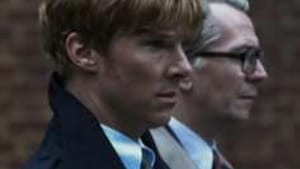Stay in the Loop
BSR publishes on a weekly schedule, with an email newsletter every Wednesday and Thursday morning. There’s no paywall, and subscribing is always free.
Lost in the Cold War
Alfredson's "Tinker Tailor Soldier Spy' (1st review)

I much prefer that my first encounter with a work of art be direct and unmediated by commentary, regardless of that commentary's source or nature. Obviously I rely on trusted critics and friends when choosing what performances/shows/books to devote my attention to. But once having arrived at the encounter, I want it to be strictly between the artist and me.
Thus I eschew pre-taped museum tours and avoid reviews that reveal details of the plot. And although I welcome Roger Ebert's take on a given film, I wait until after I've seen the movie to read his review.
Does a playwright, director or painter have any obligation to indulge my preferences? Should all artistic works be comprehensible without any reference to outside material?
Searching for coherence
These questions arose for me after seeing the new version of John Le Carré's Tinker Tailor Soldier Spy. I had neither read the book nor seen the 1979 BBC version with Alec Guinness, so I entered the theater knowing nothing other than that it was a Cold War spy drama that one of my favorite movie-going companions was rabid to see, since he loves both the book and the mini-series.
It turns out that two hours isn't enough to provide a coherent version of the complicated story; at least not a version that I found coherent. Some— preferably a great deal of— familiarity with the source material is needed to follow this impressionistic version of the plot.
The story, as best I was able to piece it together, is as follows:
Smiley is a British spy who's eased into retirement when his mentor's ploy to smoke out a double agent results in a spy's getting killed. Or not. A rogue spy contacts Smiley with more info about the double agent, who is one of four people. Smiley is brought back in to find the double agent. He does. Eventually.
Oh, and Smiley's wife is having an affair with Colin Firth— that much, at least, was clear.
Dog-paddling in a lake
Especially annoying in retrospect were the atmospheric bits that failed to further the plot. Since character development was completely beside the point, it's hard to figure out why these bits were included.
I'm thinking here of numerous interludes in which Smiley dog paddles about in a lake with his glasses on. Presumably these images resonate with those who know the story. But I was disappointed in my expectation that they would be explained.
Nor did it make sense to devote time to the relationship between a schoolteacher— who, it turns out, was the spy who got shot in the opening scenes, which I didn't realize until two-thirds of the way into the film—and one of his students. Again, these scenes did nothing to advance my understanding of what the hell was going on.
Obviously I'm quite cranky about investing two hours in a movie that still made only partial sense after I'd peppered my better-prepared pal with questions afterward. (He, by the way, liked the movie.)
Which brings me back to my original question: Is it unreasonable for me to expect a movie to make sense without significant advance preparation on my part? Do the filmmakers have any obligation to take my unprepared state into account when they decide what material to include and how to present it?♦
To read a related commentary by Dan Rottenberg, click here.
To read another review by Jake Blumgart, click here.
To read responses, click here.
Thus I eschew pre-taped museum tours and avoid reviews that reveal details of the plot. And although I welcome Roger Ebert's take on a given film, I wait until after I've seen the movie to read his review.
Does a playwright, director or painter have any obligation to indulge my preferences? Should all artistic works be comprehensible without any reference to outside material?
Searching for coherence
These questions arose for me after seeing the new version of John Le Carré's Tinker Tailor Soldier Spy. I had neither read the book nor seen the 1979 BBC version with Alec Guinness, so I entered the theater knowing nothing other than that it was a Cold War spy drama that one of my favorite movie-going companions was rabid to see, since he loves both the book and the mini-series.
It turns out that two hours isn't enough to provide a coherent version of the complicated story; at least not a version that I found coherent. Some— preferably a great deal of— familiarity with the source material is needed to follow this impressionistic version of the plot.
The story, as best I was able to piece it together, is as follows:
Smiley is a British spy who's eased into retirement when his mentor's ploy to smoke out a double agent results in a spy's getting killed. Or not. A rogue spy contacts Smiley with more info about the double agent, who is one of four people. Smiley is brought back in to find the double agent. He does. Eventually.
Oh, and Smiley's wife is having an affair with Colin Firth— that much, at least, was clear.
Dog-paddling in a lake
Especially annoying in retrospect were the atmospheric bits that failed to further the plot. Since character development was completely beside the point, it's hard to figure out why these bits were included.
I'm thinking here of numerous interludes in which Smiley dog paddles about in a lake with his glasses on. Presumably these images resonate with those who know the story. But I was disappointed in my expectation that they would be explained.
Nor did it make sense to devote time to the relationship between a schoolteacher— who, it turns out, was the spy who got shot in the opening scenes, which I didn't realize until two-thirds of the way into the film—and one of his students. Again, these scenes did nothing to advance my understanding of what the hell was going on.
Obviously I'm quite cranky about investing two hours in a movie that still made only partial sense after I'd peppered my better-prepared pal with questions afterward. (He, by the way, liked the movie.)
Which brings me back to my original question: Is it unreasonable for me to expect a movie to make sense without significant advance preparation on my part? Do the filmmakers have any obligation to take my unprepared state into account when they decide what material to include and how to present it?♦
To read a related commentary by Dan Rottenberg, click here.
To read another review by Jake Blumgart, click here.
To read responses, click here.
What, When, Where
Tinker Tailor Soldier Spy. A film directed by Tomas Alfredson, from the novel by John Le Carré. At the Ritz East, 125 S. Second Street, (215) 925-7900. For Philadelphia area show times, click here.
Sign up for our newsletter
All of the week's new articles, all in one place. Sign up for the free weekly BSR newsletters, and don't miss a conversation.

 Judy Weightman
Judy Weightman